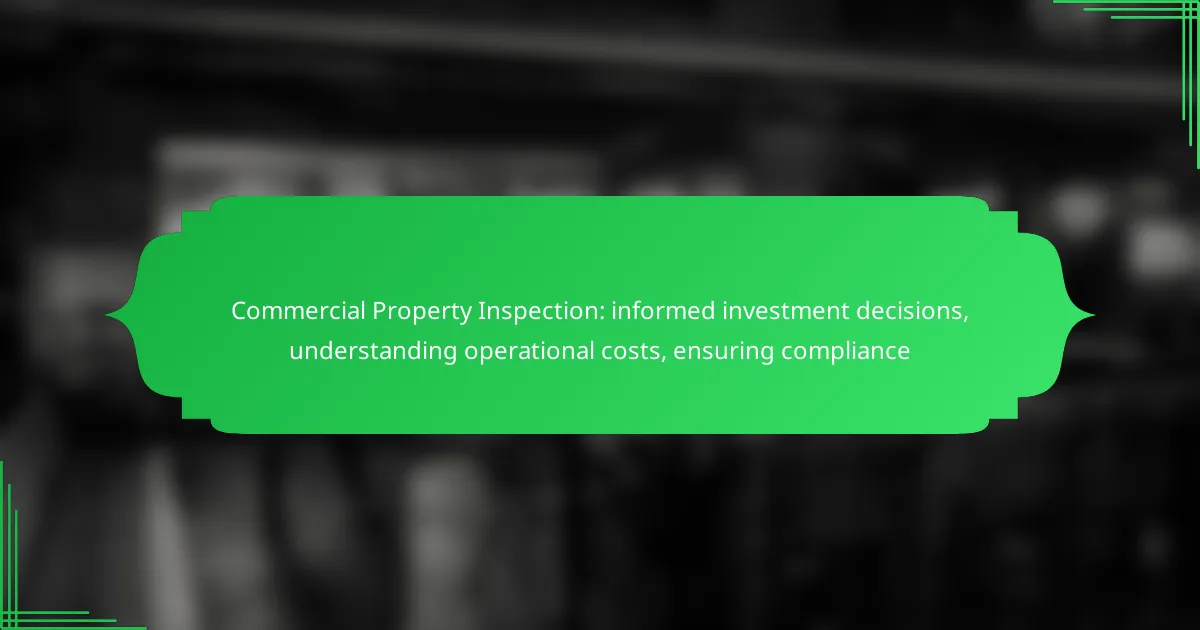Commercial property inspections are vital for making informed investment decisions, as they uncover potential risks and assess property value. By understanding operational costs and ensuring compliance with regulations, investors can effectively manage their budgets and protect their investments. These inspections provide crucial insights that facilitate sound financial choices and safeguard against legal issues.

How can commercial property inspections inform investment decisions?
Commercial property inspections play a crucial role in guiding informed investment decisions by identifying potential risks, estimating property value, and facilitating market comparisons. These inspections provide investors with essential insights into the condition and compliance of a property, helping them make sound financial choices.
Risk assessment
Risk assessment during a commercial property inspection involves evaluating the physical condition and potential liabilities associated with the property. Inspectors look for structural issues, environmental hazards, and compliance with local regulations, which can significantly impact investment viability.
Investors should prioritize properties with thorough inspection reports that highlight any red flags. For example, properties with significant deferred maintenance may require costly repairs, which can affect overall profitability. Understanding these risks allows investors to negotiate better terms or reconsider their investment strategy.
Value estimation
Value estimation is a critical component of commercial property inspections, as it helps determine the fair market value based on the property’s condition and comparable sales. Inspectors assess various factors, including location, size, and amenities, to provide a comprehensive valuation.
Investors can use inspection findings to justify their offer price or to identify undervalued properties. For instance, a property requiring minor repairs might be priced lower than similar properties, presenting an opportunity for a savvy investor to increase value through renovations.
Market comparison
Market comparison involves analyzing similar properties in the area to gauge competitive positioning and investment potential. Inspections provide data that can be compared against market trends, helping investors understand how a property stacks up against others.
Investors should consider factors such as rental rates, occupancy levels, and property features when making comparisons. For example, if a property has higher operational costs than similar buildings, it may be less attractive to potential tenants, impacting long-term returns. Utilizing inspection data in market comparisons can lead to more strategic investment decisions.

What are the operational costs associated with commercial properties?
Operational costs for commercial properties include ongoing expenses necessary for the property’s maintenance, utilities, and insurance. Understanding these costs helps investors make informed decisions and manage their budgets effectively.
Maintenance expenses
Maintenance expenses encompass routine upkeep and unexpected repairs necessary to keep a commercial property in good condition. This can include landscaping, cleaning, and HVAC servicing, which can range from a few hundred to several thousand dollars annually, depending on the property’s size and condition.
Investors should budget for both regular maintenance and a reserve for emergency repairs. A common guideline is to allocate about 1-3% of the property’s value annually for maintenance costs.
Utility costs
Utility costs cover essential services such as electricity, water, gas, and waste management. These expenses can vary widely based on the property’s size, location, and usage, often ranging from several hundred to several thousand dollars per month.
To manage utility costs effectively, property owners can implement energy-efficient systems and practices. Monitoring usage trends can also help identify areas for potential savings.
Insurance premiums
Insurance premiums protect commercial properties against various risks, including fire, theft, and liability. The cost of insurance can fluctuate based on factors like property location, size, and coverage level, typically ranging from a few hundred to several thousand dollars annually.
Investors should compare quotes from multiple insurance providers and consider bundling policies for potential discounts. Regularly reviewing coverage needs is also essential to ensure adequate protection without overpaying.

How do commercial property inspections ensure compliance?
Commercial property inspections play a crucial role in ensuring compliance with various regulations and standards. They help identify any deficiencies that could lead to legal issues or operational disruptions, ultimately protecting investments and ensuring safety.
Building code adherence
Building codes set the minimum standards for construction and safety in commercial properties. Inspections verify that structures comply with local codes, which can vary significantly by region. For example, a property in New York may have different requirements than one in Texas.
During an inspection, assessors check for compliance with zoning laws, structural integrity, and accessibility standards. Non-compliance can result in fines or costly renovations, making it essential to address any issues before acquiring a property.
Environmental regulations
Environmental regulations are designed to protect natural resources and public health. Inspections evaluate whether a property meets these regulations, which may include waste management, air quality, and water usage standards. Properties near sensitive areas, such as wetlands, often face stricter scrutiny.
For instance, a commercial building must comply with the Clean Water Act in the U.S. to prevent pollution. Failing to adhere to these regulations can lead to significant penalties and remediation costs, underscoring the importance of thorough inspections.
Safety standards
Safety standards ensure that commercial properties are safe for occupants and visitors. Inspections assess fire safety measures, emergency exits, and overall building safety. Compliance with standards such as the Occupational Safety and Health Administration (OSHA) in the U.S. is critical for operational continuity.
Regular inspections can help identify potential hazards, such as faulty wiring or inadequate fire suppression systems. Addressing these issues proactively not only ensures compliance but also enhances the safety and reputation of the business operating within the property.

What are the key components of a commercial property inspection?
A commercial property inspection focuses on assessing the condition and functionality of various systems within the property to inform investment decisions. Key components include structural integrity, electrical systems, and plumbing evaluation, each critical for understanding operational costs and ensuring compliance with local regulations.
Structural integrity
Structural integrity refers to the condition of the building’s framework, including walls, roofs, and foundations. Inspectors look for signs of damage, such as cracks, sagging, or water intrusion, which can indicate potential safety hazards or costly repairs.
When evaluating structural integrity, consider hiring a qualified engineer or inspector who can provide a thorough assessment. Regular inspections can help identify issues early, potentially saving tens of thousands in repair costs.
Electrical systems
The electrical systems inspection assesses the safety and functionality of wiring, circuit breakers, and outlets. Inspectors check for outdated components, overloaded circuits, and compliance with local electrical codes.
It’s crucial to ensure that the electrical system can handle the property’s operational demands. Upgrading an outdated system can be expensive, often ranging from a few thousand to tens of thousands of dollars, depending on the extent of the work required.
Plumbing evaluation
A plumbing evaluation examines the condition of pipes, fixtures, and drainage systems. Inspectors look for leaks, corrosion, and signs of water damage, which can lead to significant operational costs if not addressed promptly.
Consider the age of the plumbing system and any recent repairs. Replacing old pipes can be costly, often requiring several thousand dollars, but it is essential for maintaining property value and ensuring tenant satisfaction.

What qualifications should a commercial property inspector have?
A qualified commercial property inspector should possess relevant certifications, industry experience, and specialized training to effectively assess properties. These qualifications ensure that the inspector can provide accurate evaluations, identify potential issues, and help investors make informed decisions.
Certification requirements
Certification is crucial for commercial property inspectors, as it demonstrates their adherence to industry standards. In many regions, inspectors must obtain certifications from recognized organizations, such as the International Association of Certified Home Inspectors (InterNACHI) or the American Society of Home Inspectors (ASHI).
Inspectors may also need to complete state-specific licensing requirements, which can include passing exams and completing continuing education courses. Always verify that the inspector holds the necessary certifications for your area to ensure compliance with local regulations.
Industry experience
Experience in the commercial property sector is vital for inspectors to accurately assess various property types. An inspector with several years of experience is likely to have encountered a wide range of issues, making them better equipped to identify potential problems.
Look for inspectors who have worked in similar property types or sectors, such as retail, office, or industrial properties. This specialized experience can provide valuable insights into the unique challenges and operational costs associated with each property type.
Specialized training
Specialized training enhances an inspector’s ability to evaluate specific systems and components within commercial properties. This may include training in electrical systems, plumbing, HVAC, and building codes relevant to commercial real estate.
Inspectors who have undergone additional training in areas such as environmental assessments or energy efficiency can offer more comprehensive evaluations. Consider asking potential inspectors about their specialized training to ensure they can meet your specific inspection needs.

How to choose the right commercial property inspection service?
Choosing the right commercial property inspection service involves evaluating their experience, reputation, and the range of services they offer. A thorough inspection can uncover potential issues, helping you make informed investment decisions and understand operational costs.
Reputation and reviews
Start by researching the reputation of potential inspection services. Look for online reviews and testimonials from previous clients to gauge their reliability and quality of service. A company with a strong track record is more likely to provide a thorough and accurate inspection.
Consider checking platforms like Google Reviews, Yelp, or industry-specific forums. Aim for services with consistently high ratings and positive feedback, as this often reflects their expertise and customer satisfaction.
Service offerings
Evaluate the range of services offered by the inspection company. Comprehensive inspections should cover structural integrity, electrical systems, plumbing, HVAC, and compliance with local regulations. Ensure that the service includes detailed reporting and recommendations for any necessary repairs.
Some companies may offer specialized services, such as environmental assessments or energy audits. Depending on your investment goals, these additional services can provide valuable insights into potential operational costs and compliance issues.
